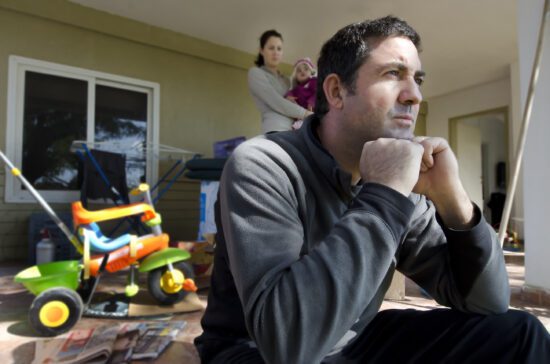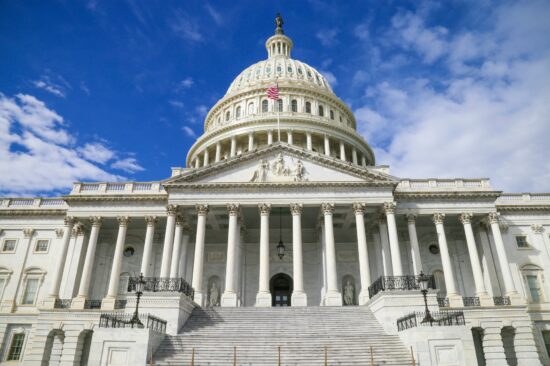Southern Baptists place a high value on the institution of the family, referred to as the “foundational institution of human society.” 1https://bfm.sbc.net/bfm2000/Additionally, our nation’s tax code and how our resources are allocated directly reflect what we as a nation value. Above other priorities, we should unequivocally communicate that our nation values life and values families.
In 2025, tax provisions included in the 2017 Tax Cuts and Jobs Act will expire. The expiration of these tax initiatives presents a unique opportunity to help vulnerable women choose life for their preborn children, enable families to financially provide for their children, encourage charitable giving and support for nonprofit entities, including churches, that exist to serve families, and reduce the costs associated with adoption and foster care. As a result, the ERLC has developed a series of priorities for negotiators to better promote life and support families as they review possible options for changes to our tax system in 2025.
5 tax priorities to promote life and support families
- Remove financial barriers for choosing life
- Improve the Adoption Tax Credit
- Reduce marriage penalties
- Support Pregnancy Resource Centers
- Support a Universal Charitable Deduction
1. Remove financial barriers for choosing life
Southern Baptists believe children are a “blessing and heritage from the Lord” 2Id. and that parents are the “primary stewards of their children.”3https://www.sbc.net/resource-library/resolutions/on-the-god-given-rights-and-responsibilities-of-parents/ They have also time and again affirmed a desire to protect the lives of precious preborn children and “eliminate any perceived need for the horror of abortion.”4https://www.sbc.net/resource-library/resolutions/on-anticipation-of-a-historic-moment-in-the-pro-life-movement/ Economic insecurity is frequently cited as the primary reason that many women choose abortion.
As a result, the ERLC is strongly supportive of the removal of any financial barriers that could discourage parents from choosing life. The ERLC is broadly supportive of policy measures that assist parents in choosing life and financially supporting their families.5https://erlc.com/wp-content/uploads/2024/01/CTC-Letter-.pdf The Child Tax Credit (CTC) has been recognized on a bipartisan basis as one of our nation’s most effective tools in combating child poverty.
In the 2017 tax negotiations, Congress acted to increase the CTC to $2,000. Without Congressional action the CTC will revert back from $2,000 to $1,000, effectively imposing a tax increase on roughly 40 million families.6https://www.whitehouse.gov/child-tax-credit/#:~:text=It%20has%20also%20being%20shown,40%20million%20families%20every%20year As such, the ERLC supports including an enhanced CTC in upcoming tax negotiations that builds on the success of the expanded CTC.
Some additional improvements that negotiators should consider include raising the maximum credit amount to keep up with inflation, ensuring that larger families are not penalized by instituting a faster credit phase-in, and that lower-income working families can benefit from the full credit, while maintaining important work requirements. Through supporting families that already have children, parents will be better equipped to care for their children and new parents will be empowered to choose life.
In addition to an expansion of the Child Tax Credit, measures such as a one-time allowance received at childbirth would ease the financial burdens associated with childbirth, postpartum care, loss of income associated with pregnancy and childbirth, and loss of income due to taking unpaid leave from the workplace. Moreover, including preborn children in the Child Tax Credit or increasing the amount of the CTC for the first few years of life could also assist in surging resources to parents at this uniquely vulnerable time. These types of payments would function as a temporary financial bridge, helping women and families to choose life. As a result, the ERLC encourages negotiators to develop similar policies designed to alleviate the one-time costs associated with pregnancy and childbirth.
2. Increase and make refundable the Adoption Tax Credit
Southern Baptists believe adoption is a central theme reflected through Scripture and a crucial way Christians can live out the tenets of our beliefs by caring for the vulnerable. A recent study found practicing Christians are twice as likely to adopt as the general population.7 https://cafo.org/new-barna-research-highlights-christian-adoption-foster-care-among-3-most-notable-vocational-trends/#:~:text=In%20fact%2C%20Barna%20Group’s%20research,the%20general%20population%20(2%25) And yet, the National Council for Adoption estimates that over 100,000 children remain available for adoption in the United States each year.8 https://adoptioncouncil.org/article/foster-care-and-adoption-statistics/
In part, this issue exists because adoption remains a lengthy and expensive process, putting it out of reach for families seeking to adopt. The Department of Health and Human Services estimates that the average cost for families to adopt ranges from $20,000–45,000 but can be higher depending on the method of adoption. 9https://cwig-prod-prod-drupal-s3fs-us-east-1.s3.amazonaws.com/public/documents/s_costs.pdf The adoption tax credit exists to assist families seeking to adopt by alleviating some of the high financial burden families incur, and the current threshold as a result of the 2017 Tax Cuts and Jobs Act is $15,950 per adopted child. However, families that earn less than $30,000 are ineligible to receive this tax benefit, and families earning between $30,000–50,000 only receive a partial tax credit, meaning many families that this tax credit was intended to help will not receive assistance.
The ERLC supports legislation like the Adoption Tax Credit Refundability Act, which would improve the efficacy of the existing adoption tax credit by making it fully refundable. A refundable adoption tax credit would assist the majority of families who participate in adoption and make less than $100,000 annually by ensuring they are able to receive the full benefit of this credit.10 https://taxpolicycenter.org/briefing-book/what-adoption-tax-credit Similarly, increasing the overall amount of the adoption tax credit will assist families by allowing them to afford the many components of the adoption process in an expedited time frame. The ERLC urges negotiators to consider these tangible steps to help these vulnerable children in our nation be placed into loving homes and encourage women and families to choose life.
3. Reduce marriage penalties
Southern Baptists believe marriage is “the uniting of one man and one woman in covenant commitment for a lifetime. It is God’s unique gift to reveal the union between Christ and his Church and to provide for the man and the woman in marriage the framework for intimate companionship, the channel of sexual expression according to biblical standards, and the means for procreation of the human race.” 11https://bfm.sbc.net/bfm2000/ Secular research also reflects that marriage is a necessary family structure that promotes human flourishing for children and society at large; recent studies show that children who grow up in a two-parent household are less likely to be depressed, convicted of a crime, or a lower-income adult.12 https://ifstudies.org/blog/new-research-confirms-having-married-parents-helps-kids-get-ahead#:~:text=The%20finding%20that%20children%20who,young%2C%20be%20depressed%2C%20be%20convicted
As a result, the ERLC encourages negotiators to evaluate and remove marriage penalties in the current tax code. One such example of this is the Head of Household status, which provides a larger standard deduction to unmarried taxpayers in care of other persons, a policy initially intended to support lower-income individuals who had dependents and yet were unmarried, particularly single mothers. In practice, this policy encourages individuals not to marry since by cohabitating couples receive a net refund greater than a married couple. Additionally, this policy is typically most often utilized by higher income single parents, not the low income families it was intended to assist.13 https://www.niskanencenter.org/building-a-stronger-foundation-for-american-families-options-for-child-tax-credit-reform/#:~:text=HoH%20filing%20status%20has%20two,%246%2C950%20difference%20%E2%80%93%20in%202023) As a result, the ERLC urges negotiators to consider removing Head of Household status and other marriage penalties, thereby further encouraging two-parent households. This should be paired with a significant increase in the Child Tax Credit to avoid penalizing working-class and middle-class single-parent households.
4. Support Pregnancy Resource Centers through tax credits
Southern Baptists support life inside and outside of the womb, as evidenced through the wide array of support provided to these centers, often on a volunteer basis and through donations. Pregnancy resource centers (PRCs), also referred to as crisis pregnancy centers, provide lifesaving services to mothers, families, and preborn children. In 2019, an estimated 2,700 pregnancy resource centers served approximately 2 million clients, providing free or low-cost pregnancy tests, testing for sexually transmitted diseases, and ultrasounds.14 https://lozierinstitute.org/fact-sheet-pro-life-pregnancy-centers-deliver-real-world-results/ This amounts to roughly $270 million in services and countless support in the form of mentorship and material support provided at little or no cost to clients. As a recent Lifeway Research study shows, 16% of churchgoers reported that their church has financially supported a local pregnancy resource center, and 14% said their church has encouraged congregants to personally financially support these centers. 15https://research.lifeway.com/2024/06/18/some-churches-partner-with-pregnancy-centers-after-roe-v-wade/
The ERLC supports legislation that seeks to assist PRCs in growing in their capacity to serve families. For example, the Pregnancy Center Support Act (S.3610) would implement a 50% tax credit for donations made to pregnancy resource centers by taxpayers, further incentivizing individuals to generously give directly to PRCs. 16https://www.congress.gov/bill/118th-congress/senate-bill/3610?q=%7B%22search%22%3A%22Pregnancy+Center+Support+Act%22%7D&s=1&r=2 The ERLC encourages negotiators to include a similar provision in future tax negotiations that would lead to increased donations to PRCs, resulting in more preborn lives saved and families served.
5. Support a Universal Charitable Deduction
Southern Baptists have affirmed tax policies that incentivize charitable giving, seeing it as a way to encourage generosity and care for the vulnerable.17 https://www.sbc.net/resource-library/resolutions/resolution-on-deductibility-of-charitable-contributions/ Many of the institutions undergirding our society, including churches and faith-based organizations, rely on the generosity of others to serve their neighbors and fill the gap between the government’s services and their local community’s needs. As a result, the ERLC supports the inclusion of a tax provision that would no longer require taxpayers to itemize their tax returns in order to claim the charitable tax deduction.
Churches and faith-based organizations are indispensable service providers in meeting the needs of America’s most vulnerable populations. Without faith-based organizations, millions of Americans would not receive the critical services they need to thrive and flourish. From services for mental health and addiction, to homeless shelters, to healthcare, to immigrant and refugee services, faith-based organizations are at the forefront of serving our country’s most needy communities. Religious congregations provide 7.6 million volunteers to run 1.5 million social programs in America each year.18 https://www.religjournal.com/pdf/ijrr12003.pdf And the impact of these groups continues to grow. Researchers Brian and Melissa Grim report that “religious organizations have tripled the amount of money spent on social programs in the last 15 years to $9 billion.19Id. They also explain that 40% of the top 50 charities in the U.S. are faith-based, with combined operating budgets of over $45.3 billion.20https://www.forbes.com/top-charities/list/ It is important to note that many of these faith-based organizations choose to reject government funds due to their deeply held religious beliefs, making charitable contributions the primary way they fund their ministries and activities.
The Tax Cuts and Jobs Act of 2017 created a new standard whereby taxpayers must itemize their giving in order to receive the charitable deduction tax benefit. When paired with the increase of the standard deduction, only roughly 10% of taxpayers are currently eligible to receive the existing charitable deduction. As a result, current federal tax policies no longer encourage most taxpayers to financially contribute to charity.21https://philanthropy.indianapolis.iu.edu/news-events/news/_news/2024/tax-law-change-caused-us-charitable-giving-to-drop-by-about-20-billion-new-study-shows.html#:~:text=The%20TCJA%20substantially%20reduced%20the,the%20standard%20deduction%20in%202018 When adjusted for inflation, 2023 total giving declined by 2.1%, and individual giving declined by 2.4%.22https://philanthropy.indianapolis.iu.edu/news-events/news/_news/2024/giving-usa-us-charitable-giving-totaled-557.16-billion-in-2023.html
As a result, the ERLC supports a Universal Charitable Deduction (UCD). A UCD would incentivize all taxpayers, not just higher income taxpayers who itemize their deductions, to generously donate to the vital work of charities. The ERLC supports legislation to this effect, such as the Charitable Act, which would increase the UCD to an amount of up to one-third of the standard tax deduction.23https://www.congress.gov/bill/118th-congress/senate-bill/566/cosponsors?s=1&r=16&overview=closed The ERLC encourages negotiators to implement a UCD or a similar policy to further incentivize charitable giving.
Conclusion
In 2025, Congress has a unique opportunity to build upon and improve the helpful policies established by the 2017 Tax Cuts and Jobs Act, with an aim to support working families and further ingrain pro-life, pro-family values into our nation’s tax policy. The ERLC is committed to advocating for improvements that strengthen families and create an environment where they can thrive. We believe these recommendations can be helpful as you balance various policy priorities while pursuing fiscally responsible updates to federal family benefits through the tax code.









